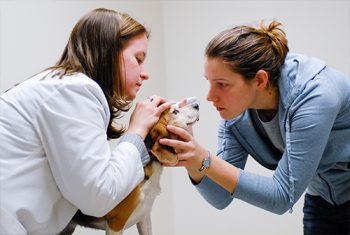It is never too early to start preparing for a career in veterinary medicine. Learning as much as you can about veterinary medicine, veterinary nursing, and other animal and health careers is important for your future success.
What do veterinary nurses and veterinarians do?
The MSU College of Veterinary Medicine offers both a Veterinary Nursing Program, whose graduates commonly become veterinary nurses, and a Doctor of Veterinary Medicine Program, whose graduates commonly become veterinarians.
What do veterinary nurses do?
Among many other important tasks, veterinary nurses:
- Handle sample collection
- Perform diagnostic tests on patients, such as blood work and x-rays
- Provide nursing care, such as administering medications
- Assist in surgery by anesthetizing patients and helping the surgeon
What do veterinarians do?
- Diagnose patients
- Make prognoses for patients
- Perform surgical procedures
- Prescribe treatments and medications

Which area of veterinary medicine is right for you?
Veterinary medicine offers many specialties for doctors of veterinary medicine and veterinary nurses; not just private practice. Some include ophthalmology, diagnostic imaging, pathology, zoo and wildlife, and orthopedics, among many others.
There are also many workplaces, industries, and fields that require veterinary professionals. Some include:
- Government
- Zoos and wildlife sanctuaries
- Animal rescues and shelters
- Equine practice
- Emergency medicine
- Research laboratories
- Military
- Specialty practices
- Teaching
- Pet food industry
- Production animal facilities
- Pharmaceutical companies
- Mixed animal practices
- Small animal practices
MSU and the College of Veterinary Medicine also offer multiple opportunities to visit campus and learn more about life at MSU, as well as veterinary medicine.
Academic Preparation

Academic preparation should include, but is not limited to, a strong math and science curriculum. Courses should include:
- Mathematics
- Algebra I
- Algebra II
- Trigonometry
- Pre-calculus
- Sciences
- Biology – strongly recommend two years
- Chemistry – minimum one year
- Physics – minimum one year if high school offers it
- Veterinary Science – if high school offers it
Advanced Placement, International Baccalaureate, and dual enrollment courses also are strongly encouraged.
Gaining Animal-Related Experience
Any experience with animals is beneficial when pursuing a career in veterinary medicine. Future veterinary students often start gaining animal-related experience as young as 10 or 12 years old. Experience with animals can come from a variety of sources including:
Gaining Veterinary-Related Experience
When deciding whether a career in veterinary medicine is the right choice, it is important to gain experience under the supervision of a veterinarian. Do not wait until you start your college education to gain veterinary experience, as it can be difficult to do so in addition to juggling a college workload and social life.
Ask local veterinarians if you may job shadow them and observe a day in the life of a veterinarian. Build a good working relationship with the veterinarian; it is important to start building professional relationships as you prepare for your career in veterinary medicine.
Gain Other Valuable Skills
Skills that benefit future veterinarians:
- Communication, both verbal and written
- Interpersonal skills
- Teamwork
- Leadership
- Organizational skills
- Problem-solving
